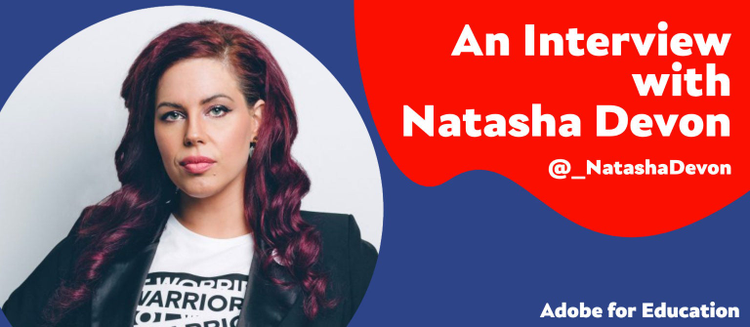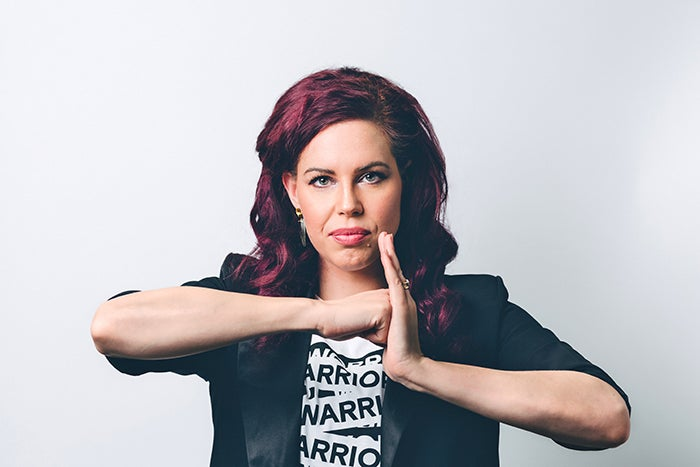The Matrix Of Mental Health — Natasha Devon

Image featuring Natasha Devon.
We’re at a unique moment in history when we can look at education from a different vantage point with school closures forcing us to re-evaluate what education means and where it is going.
I set about interviewing some of education’s most interesting people in researching my book, Literacy Beyond The Classroom, in order to get deeper insights on how we might rethink education.
Natasha Devon MBE is a writer & activist. She tours schools, colleges, universities and events throughout the world, delivering talks as well as conducting research on mental health, body image, gender and social equality.

I wanted to learn more and interviewed Natasha Devon to dig deep into mental health, how it affects our young people and how it might be best tackled in schools.
Natasha, whilst many of us are aware of mental health as an issue, can you explain how you interpret mental health in an everyday context?
One of the most important parts of my work is about making people realise that everyone has mental health but not everyone has a mental illness. We’re taught a binary view of how someone might have had mental illness and then they recovered but it’s much more of a process whereby our mental illness status can fluctuate. You can live with a mental illness and still be successful, just like a physical illness, by learning the adjustments you need to make to live alongside that illness.
I like to refer to a matrix with mental illness on one axis and mental fitness on the other. A mental illness can be something that we inherit or something that develops over time but mental fitness is always something that we can work on. Young people need to understand that it’s as important as eating your fruit and veg, it’s your mental health five a day.

How does poor mental fitness develop?
The crucial thing to understand is that we have so much more control over mental fitness and so we should always be trying to nip things in the bud and emptying the stress bucket daily if possible. It’s crucial that we recognise the point at which diminishing returns kick when we stop doing the things that keep our mental fitness topped up. Many children are going into exam periods saying I love the violin or I love my sports club but I’m not going to do them now so I can focus on my exams.

These things are sometimes seen as optional extras but they’re not on so many levels. Children need them more than ever because they are going to help them manage their stress levels.
How should we look to bring mental health into the conversation with young people?
My approach with younger students is to have a daily check in about their feelings so that they can understand more easily what their normal baseline is. Once that becomes a routine, it becomes easier to identify over a longer period of time if they have deviated from that baseline.
With older students who feel emotionally overwhelmed, I give them 3 pieces of paper: problems I have no control over, problems I need someone’s help with, problems I can solve myself. Then I get them to destroy the one I have no control over because then they are left with a to do list. As human beings, we tend to collect our worries, regardless of what they are and whether they can do anything about it so it’s important to distinguish between them.

I also ask young people to think about their network. One of the best skills we can teach young people is to discern who they need to speak to on different days. Sometimes, they need tough love but some days you need someone to listen and ask open questions and tell you it’s going to be okay.
How can the curriculum support mental health?
The curriculum needs redesigning because we now know so much more about neurological development. We know that a teenage brain is very different from an adult brain and we know that a child brain is very different from a teenage brain. The very idea that we are suddenly an adult at 18 is ridiculous. Our brains don’t finish developing until our mid-twenties. Between the ages of 0-7, we lay down all our fundamental psychological programming, absorbing the world like a sponge. Crucially, our brain develops back to front so reasoning doesn’t really develop until 7. So before that age, they’re not thinking critically but rather learning through repetition. We should therefore adapt our practice in schools to build a strong, emotional framework by introducing small routines like daily meditation and everyday discussions around mental health.

In terms of subjects, we all know how tough it can be to squeeze things into the curriculum which leads me to believe that English as a subject can play a huge role. Creative writing can empty the stress bucket, get you into the moment and can be very cathartic. Equally, a non-fiction project around mental health is a great way for children to learn about mental health in a non-judgemental way.

Literature is also an excellent medium: Shakespeare in particular is a rich hunting ground. We have always been taught that Romeo and Juliet is a love story but it’s about two young people who take their lives and four other lives in the process! Romeo is also probably bi-polar. Similarly, Hamlet is very sleep deprived and experiencing psychosis. These things can fuel a healthy classroom discussion about really important things that children might be going through, normalising things that are too often seen as taboo.
Adobe Education is keen for teachers to approach the topic of mental health using digital media as a way to explore the benefits of things like meditation. Our Education Evangelist for EMEA, Dominic Traynor, has created a 5 lesson sequence that guides your students to write, present and edit their own video explaining the benefits of mindfulness.
Learn more at here.
At Adobe, we believe that everyone deserves respect and equal treatment, and we also stand with the Black community against hate, intolerance and racism. We will continue to support, elevate, and amplify diverse voices through our community of employees, creatives, customers and partners. We believe Adobe has a responsibility to drive change and ensure that every individual feels a sense of belonging and inclusion. We must stand up and speak out against racial inequality and injustice. Read more about the actions we’re taking to make lasting change inside and outside of our company.
We also know many people are still impacted by the current COVID-19 crisis and our thoughts are with you. The entire Adobe team wants to thank you, our customers, and all creators around the world for the work you do to keep us inspired during this difficult time.